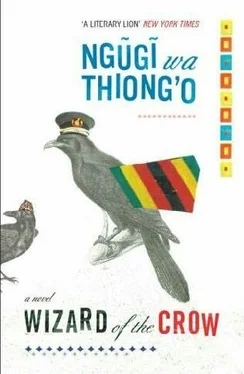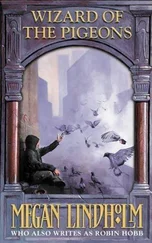“Can you believe that despite his interference in matters that did not concern him and his failure to capture the runaway mkokoteni, Kaniürü has been entrusted by the Ruler to bring in the fugitives?”
“That man! I don’t know what it will take to stop him from benefiting from his evil ways,” Vinjinia said. “What about the three policemen? How did they explain their behavior?”
“A.G., Kahiga, and Njoya have joined the ranks of the jobless,” Tajirika said.
The news gnawed at her. “How could the Ruler dismiss the three who had served him so loyally?”
“The Ruler is never wrong,” Tajirika hastened to say. “I am sure he would not have dismissed the officers without good reason.”
“True, Haki ya Mungu, when we went back to the State House we found that Kaniürü had already poisoned the atmosphere with lies. He even claimed that he found us surrounded by tourists with cameras clicking away at the sight of policemen riding a donkey cart, a scene that gave the impression that the Ruler was so broke he could only afford carts for his police force!
“They dismissed us from our jobs and told us to get out of government housing immediately. Stray dogs, even when they have snatched something, are treated more kindly by passersby than we were treated by those we had faithfully served all our lives.
“I don’t know about the other two, but I had no land or house or any property that I could call my own. In discussing the options before us, we realized, too late, that we had no skills other than those of arresting, torturing, and taking people to court. The only jobs that offered possibilities were the private security firms that were mushrooming throughout the country. With the much-flaunted IMF-brokered prosperity confined to a few, the houses of the rich had become luxurious prisons. But imagine the shame of two ex-superintendents and one ex-assistant police commissioner reduced to guarding people’s houses with a terrier’s leash in one hand and a knock-berry club in the other! Or simply armed with bows and arrows?
“We sat down by the roadside near the same railway crossing, wondering why fate had dealt us such a blow. Where are we to gor Why has good fortune abandoned us when we most need it? Who was this Limping Witch?” Kahiga moaned.
The Limping Witch and the Wizard of the Crow are one and the same, a worn-down A.G. told Njoya and Kahiga solemnly. A disagreement erupted among them, Kahiga and Njoya maintaining that the Limping Witch and the Wizard of the Crow were different and distinct entities. A.C. tried to explain that there were times when the wizard appeared as female and other times as male. The Limping Witch is the other face of the wizard, and the captive was simply his shadow. He told them of the night he had chased two human-shaped apparitions in the prairie but that when they jumped over the rock cleft as two-”You remember the rock and the bush where we saw the plants with the dollar-shaped leaves?”-they became one person…
No sooner were the dollar-shaped leaves mentioned than Kahiga snapped to attention. “I say, let us go and look for the Wizard of the Crow, be he the Limping Witch or not, a woman or not, a shadow or not,” he said excitedly.
What? After what the Ruler has done to us?” asked A.C., surprised by his own critical tone.
“Yes, a donkey expresses gratitude by its kicks,” Njoya observed.
“There, you have said it,” Kahiga said. “Remember the holes we dug night and day in the prairie? Did we ever get anything for our effort? We don’t even know what they did with the plants. And now this? Dismissals based on brazen lies! No. We are going to look for the Wizard of the Crow, all right, but this time for ourselves. See? We tell him about our jobless misery. We will pray to him to tell us the secret of growing money on trees. We don’t need to know about the dollar-producing type. For us a Burl-producing plant will do,” Kahiga noted as the other two nodded in agreement.
Before parting they entered a pact of mutual cooperation. They would go their separate ways but whoever came across information about the whereabouts of the Wizard of the Crow would share it with the others immediately. All three had to be present when the Wizard of the Crow disclosed how to grow money on trees.
“True! Haki ya Mungu!” A.C. would later tell his listeners. “From that day we clothed in civilian clothes and joined the ranks of thousands of others, from the foot soldier to members of the elite air force, who had been fired. From being fishers of men to sustain the State, we three were now fishers of the Wizard of the Crow to sustain ourselves. But for me-True! Haki ya Mungu! -it was not the lure of the money-producing plants that attracted me to the search but the desire to know the secret of the being of all things.
“One day I heard that the Wizard of the Crow had been seen in the vicinity of All Saints Cathedral, and I searched out Njoya and Kahiga to share with them this bit of information. They, it seemed, had beaten me to the cathedral. Had they forgotten our pact? Well, I, too, headed there, and imagine my surprise when I found that the entire cathedral… but surely you, too, must have been there that day?”
Given all that was happening in the country, that the Limping Witch and the Wizard of the Crow were on the loose made the Ruler feel like a cornered, toothless animal. At the State House, where he monitored everything, he received hourly reports from different sources, chaotic reports reflecting the chaos of events taking place. Queues, which had formed in the different regions of the country for different reasons, were amassing by the Parliament buildings and law courts. As the crowd grew, the Ruler felt restricted in the choices before him.
Since Kaniürü’s patriotic gang had beat up foreign journalists at the airport, provoking protests from the Western embassies, the Ruler had ordered the police, the paramilitary units, and even Kaniürü’s boys to be careful, very careful, before foreign cameras. If they really felt like cracking a few skulls, they should do so in rural areas and small towns. Not that he was angry with those who had ignored his call for self-restraint and had broken a few bones of those inciting others to go to the so-called People’s Assembly. But he did not want them to do anything that might suggest that he was afraid of a peaceful gathering on the grounds of Parliament and the courts. So even though he seethed with murderous rage, he refused to succumb to instinct and unleash his killers against the dissidents. His hope was that people would eventually tire of all speechifying and go home thirsty and hungry.
But that was not to be. Many had packed food. The owners of small restaurants and kiosks provided snacks, and some matatus brought in food from the rural folk. So the assembly continued to grow in strength, confidence, and courage. When early on the police tried to remove a loudspeaker from a makeshift platform, people had roared in protest, threatening chaos and forcing the police to leave it.
Soon a pattern began to emerge at the proceedings. Religious leaders would lead the assembly in prayer, a common theme being that God vanquishes Satan so that peace and prosperity could reign in Aburiria. Hymns followed the prayers, then sermons from the clerics, adhering strictly to the holy books. And then anybody who wanted to speak could do so. The Ruler was of course not amused by any of this. Only the prospect of Global Bank money restrained him.
For a few days, the mystery of Machokali’s disappearance became the unifying theme. If even the Minister for Foreign Affairs, moreover one known all over the world, could vanish without anybody being held accountable, who could claim to be safe anywhere in the Republic of Aburiria? We want the truth! We want the truth! became a recurring cry. Some even said that if the truth about the missing minister was not forthcoming they would march to the State House to look for him there. Let them talk themselves hoarse, said the Ruler, grinding his teeth, but woe to them that dare to come here. He considered sending Kaniürü’s goons to provoke a march on the State House but thought the better of it, as he did not think that images of such a march would play well on television screens around the world. And so, with both sides waiting for the other’s next move, there was an impasse, both camps eyeing each other warily, testing each other only with words.
Читать дальше












